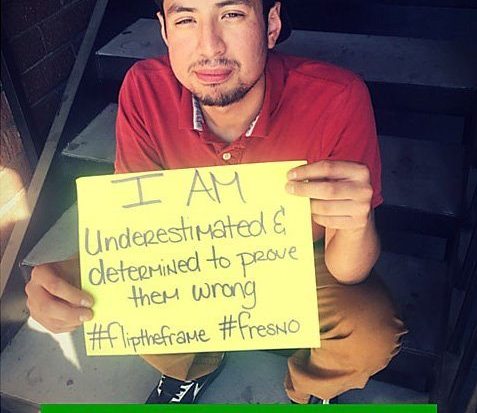
By Cheyann Wakefield
As a senior at Fresno High, I look forward to what my future holds and I reflect on my experience as a Fresno Unified School District (FUSD) student. I think about what I’ve been able to accomplish and what could have helped me be more successful. Just as I am leaving, the FUSD is set to receive more state funding than ever before. The Local Control Funding Formula (LCFF), a new funding law, was developed to make schools more equitable throughout California.
Building Healthy Communities (BHC)–United Youth Voices, a local coalition aimed at improving the quality of life for Fresno’s young people to promote healthier schools, knew this could be a big opportunity for Fresno when the LCFF was signed in July 2013. Districts with high percentages of three target student groups—English language learners, low-income and foster youth—would receive extra funds.
More than 90% of FUSD students are estimated to fall under at least one of the three categories and, according to the FUSD, the district will receive up to $11,722 per student by the year 2020–2021. The LCFF also requires improvement in eight priority areas, such as student achievement and school climate, and demands meaningful engagement of parents, teachers and other stakeholders in the budgeting process. Unfortunately, at this time, engagement of students is not a requirement.
Because this is a landmark change, it is important to have real measures of accountability to ensure the FUSD spends the new funding on who it is intended for, that is, those within the three target groups.
The FUSD is set to release its Local Control Accountability Plan (LCAP) at the end of April. This will act as its proposed map to spend the new funding.
After speaking to BHC–United Youth Voices, it is not clear that the FUSD has done enough to meaningfully engage parents, students and allies in the LCAP process. If the district had, Superintendent Michael Hanson might not have announced his proposal to spend $3.5 million of the LCFF funding on security cameras, something BHC–United Youth Voices is adamantly against.
Most would agree that schools should be a safe environment for students and teachers, but security cameras have not been proven to improve the school climate. Security cameras are a way to catch someone if they’re being disruptive in class, but is suspending or expelling everyone going to make our schools better? The FUSD already has some of the highest suspension, expulsion and dropout rates in the state. If this kind of solution was effective, the FUSD would be ranked one of the best but this is not the case.
For me, I never got suspended but I was always looking for a way out of attending school. By suspending students or expelling them, youth may view it as a vacation; in a way, it is rewarding them rather than punishing them. The goal should be to find out why the individual is being disobedient, so there are fewer class disruptions and more young people graduating.
Restorative practices, a program the FUSD adopted last year, does just that; it provides an alternative to suspensions and expulsions. The pilot program, which is in its first year, focuses on McLane High School and its feeder schools and has already spent most of the $500,000 allocated in last year’s resolution. The district and students have expressed that the pilot will need more funding to be fully implemented, but the FUSD will not release the amount needed. Although this program was developed before the LCFF, it has been proven to improve the school climate, one of the eight priority areas.
As a community-based coalition, BHC–United Youth Voices is working to ensure that the LCFF funds go toward making schools a healthier place. They demand that the FUSD achieve meaningful engagement of youth by creating a Youth Advisory Council, like other districts throughout the state, and fully fund its Restorative Practices pilot program. This council will give youth an opportunity to help make decisions on how the LCFF funds can be used.
We will wait to see if any of these community recommendations will be included in the LCAP. Superintendent Hanson’s proposal needs to be revised, keeping youth in mind to shape the plan.
*****
Cheyann Wakefield is a senior at Fresno High School and an intern with Californians for Justice. For more information about the work of United Youth Voice, contact mlopez@newamericanmedia.org or grodriguez@yli.org.
